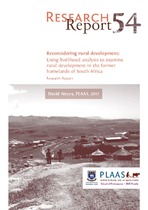| dc.contributor.author | Neves, David | |
| dc.date.accessioned | 2019-03-13T13:02:35Z | |
| dc.date.available | 2019-03-13T13:02:35Z | |
| dc.date.issued | 2017 | |
| dc.identifier.citation | Neves, D. (2017). Reconsidering rural development: Using livelihood analysis to examine rural development in the former homelands of South Africa. Research Report 54. Institute for Poverty, Land and Agrarian Studies, University of the Western Cape | en_US |
| dc.identifier.uri | http://hdl.handle.net/10566/4506 | |
| dc.description.abstract | ‘Rural development’ as concept and focus of
public policy is comparatively new, having
emerged in the post-war period. Much of the
impetus for ‘rural development’ arose in the
context of newly decolonised, low-income
countries, where particularly development
economists mooted the ability of the smallscale
and subsistence agricultural sector to
proactively contribute to national economic
development. Early efforts to promote rural
development were, therefore, not driven simply
by the promise of increasing rural employment
and food production. Instead, it was
believed that rising agricultural productivity
would drive national development by freeing
up a marketable surplus, attracting foreign
exchange, and providing a market for domestic
industrial production. | en_US |
| dc.language.iso | en | en_US |
| dc.publisher | Institute for Poverty, Land and Agrarian Studies, University of the Western Cape | en_US |
| dc.relation.ispartofseries | Research Report;54 | |
| dc.subject | Rural development | en_US |
| dc.subject | Former homelands | en_US |
| dc.subject | South Africa | en_US |
| dc.subject | Public policy | en_US |
| dc.subject | Agricultural sector | en_US |
| dc.title | Reconsidering rural development: Using livelihood analysis to examine rural development in the former homelands of South Africa | en_US |
| dc.type | Other | en_US |

